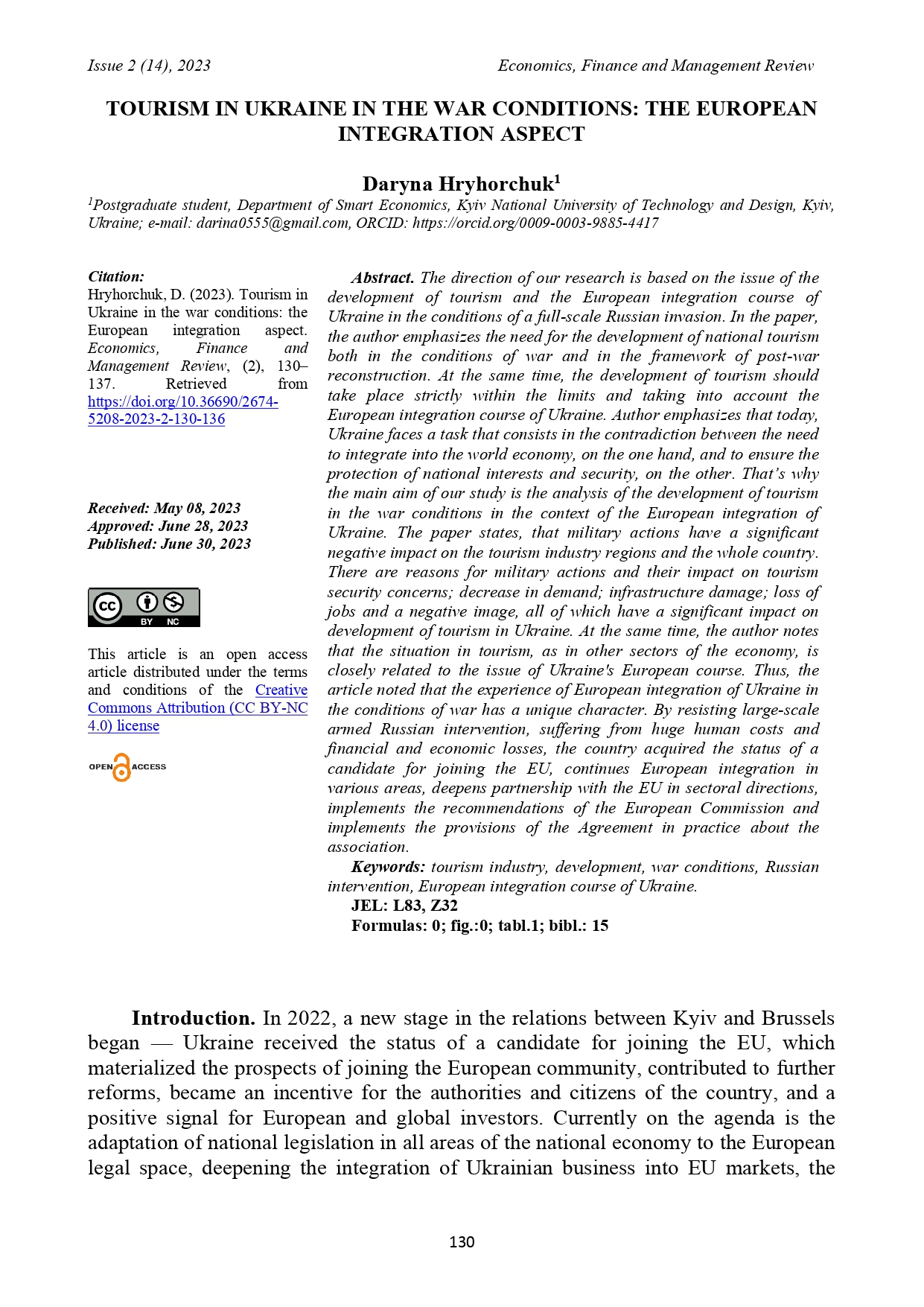TOURISM IN UKRAINE IN THE WAR CONDITIONS: THE EUROPEAN INTEGRATION ASPECT
DOI:
https://doi.org/10.36690/2674-5208-2023-2-130-136Keywords:
tourism industry, development, war conditions, Russian intervention, European integration course of UkraineAbstract
The direction of our research is based on the issue of the development of tourism and the European integration course of Ukraine in the conditions of a full-scale Russian invasion. In the paper, the author emphasizes the need for the development of national tourism both in the conditions of war and in the framework of post-war reconstruction. At the same time, the development of tourism should take place strictly within the limits and taking into account the European integration course of Ukraine. Author emphasizes that today, Ukraine faces a task that consists in the contradiction between the need to integrate into the world economy, on the one hand, and to ensure the protection of national interests and security, on the other. That’s why the main aim of our study is the analysis of the development of tourism in the war conditions in the context of the European integration of Ukraine. The paper states, that military actions have a significant negative impact on the tourism industry regions and the whole country. There are reasons for military actions and their impact on tourism security concerns; decrease in demand; infrastructure damage; loss of jobs and a negative image, all of which have a significant impact on development of tourism in Ukraine. At the same time, the author notes that the situation in tourism, as in other sectors of the economy, is closely related to the issue of Ukraine's European course. Thus, the article noted that the experience of European integration of Ukraine in the conditions of war has a unique character. By resisting large-scale armed Russian intervention, suffering from huge human costs and financial and economic losses, the country acquired the status of a candidate for joining the EU, continues European integration in various areas, deepens partnership with the EU in sectoral directions, implements the recommendations of the European Commission and implements the provisions of the Agreement in practice about the association.
Downloads
References
Alipour, H., & Dizdarevic, L. (2007). A Conceptual Sustainability Approach to Tourism Planning and Development in Post-War Bosnia and Herzegovina (BiH). Tourism and Hospitality Planning & Development, 4(3), 211–230.
Alvarez, M. D., & Campo, S. (2014). The influence of political conflicts on country image and intention to visit: A study of Israel’s image. Tourism Management, 40, 70–78.
Causevic, S., & Lynch, P. (2011). Phoenix Tourism. Annals of Tourism Research, 38(3), 780–800.
Causevic, S., & Lynch, P. (2013). Political (in)stability and its influence on tourism development. Tourism Management, 34, 145–157.
DART (2022, December, 23). Due to the war, revenues to the state budget from the tourism industry decreased by almost 34%. Retrieved from https://www.tourism.gov.ua/blog/cherez-viynu-nadhodzhennya-do-derzhbyudzhetu-vid-turgaluzi-skorotilisya-mayzhe-na-34
Hall, D. (2003). Rejuvenation, Diversification and Imagery: Sustainability Conflicts for Tourism Policy in the Eastern Adriatic. Journal of Sustainable Tourism, 11(2-3), 280–294.
Huang, Y.-C., Tseng, Y.-P., & Petrick, J. F. (2008). Crisis Management Planning to Restore Tourism After Disaster. Journal of Travel & Tourism Marketing, 23(2-4), 203–221/
Kvasnii, L., Moravska, O., Malyk, L., Shulzhyk, Y., Orlova, O., & Scherban, Oresta (2023). Scenarios Of The Development Of Enterprises Of The Tourist Industry Of Ukraine In The Conditions Of The War And Post-War Periods. Financial and credit activity problems of theory and practice, 2, 313-325. 10.55643/fcaptp.2.49.2023.3999.
Kostynets, Y., & Kostynets, V. (2023). Sustainable Business Development In The Context Of The Contemporary Risks And Challenges. Economics, Finance and Management Review, (1), 4–12. https://doi.org/10.36690/2674-5208-2023-1-4
Mashika, Gh. V., P'jatka, N. S. (2022). Peculiarities of the functioning of the subjects of the tourism industry in the conditions of war. Economics and society, 44. Retrieved from http://economyandsociety .in.ua/index.php/journal/article/view/1833
Nikolova, M. (2022, August 2). How Russia’s war on Ukraine impacts travel and tourism. Retrieved from https://emerging-europe.com/news/how-russias-war-on-ukraine-impacts-travel-and-tourism/
Novelli, M., Morgan, N., & Nibigira, C. (2012). Tourism in a post-conflict situation of fragility. Annals of Tourism Research, 39(3), 1446–1469.
Fernando, S., Bandara, J. S., & Smith, C. (2013). Regaining Missed Opportunities: The Role of Tourism in Post-war Development in Sri Lanka. Asia Pacific Journal of Tourism Research, 18(7), 685–711.
Vitic, A., & Ringer, G. (2008). Branding Post-Conflict Destinations. Journal of Travel & Tourism Marketing, 23(2-4), 127–137.
Winter, T. (2008). Post-conflict Heritage and Tourism in Cambodia: The Burden of Angkor. International Journal of Heritage Studies, 14(6), 524–539.

Downloads
Published
How to Cite
Issue
Section
License

This work is licensed under a Creative Commons Attribution-NonCommercial 4.0 International License.








